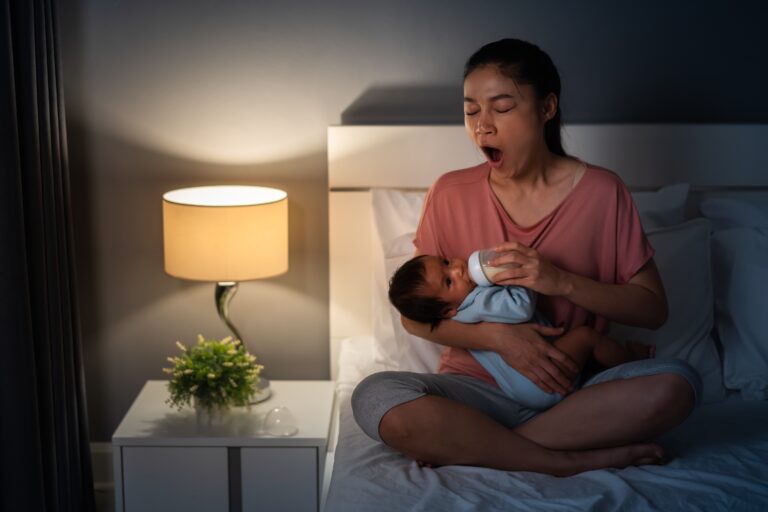Let’s talk about sleep. We know we need it, but many of us aren’t getting enough of it. According to the National Sleep Foundation, most adults need between 7 and 9 hours of sleep per night, and a consistent bedtime is recommended – even on the weekends. I know what you’re thinking – “Who has time for that?” With so much to do on any given day, it’s easy to skimp on sleep to fit everything else in. However, insufficient sleep (not getting enough) or poor sleep quality (restless sleep or waking up frequently) is linked to many health impairments, including obesity, diabetes, cardiovascular disease, and decreased immune functioning. Sleep deprivation can have a significant impact on mood, too – people who reported less sleep also reported feeling more angry, sad, and stressed.
To make matters worse, women – especially working mothers – may have worse sleep quality compared to men. For example, full-time working mothers reported that their sleep was disrupted by having young children – which is a shock to absolutely no one – but interestingly enough, fathers did not report the same. Mothers who work more than 35 hours per week are more likely to not get enough sleep, especially those who work nonstandard work hours (like those working overnight shifts). And speaking of work hours, researchers found that women who were dissatisfied with their work hours were more likely to have restless sleep.
Poor or insufficient sleep doesn’t just hurt your health; it can cause your job performance to suffer as well. Researchers found that sleep deprivation in working mothers was associated with decreased professional performance. Working mothers who are dissatisfied with their work-life balance are more likely to experience depression if they do not get enough sleep. Worse yet, the COVID-19 pandemic disproportionately affected mothers’ sleep quality. For those going back to the office – or those who never stopped – longer commute times are also related to more sleep problems in working mothers.
Researchers have also found other simple strategies for getting a better night’s rest. For example, yoga has been shown to improve sleep quality. No need to splurge on a yoga gym membership, though; there are plenty of videos you can follow along with on YouTube. You can also try taking short walks throughout the day, as walking has been shown to improve sleep quality. Putting together your Christmas wishlist? You might want to add a footbath massager. Believe it or not, taking periodic footbaths can help you get better sleep, too! Finally, mindfulness (check out our mindfulness post!) is also related to improved sleep quality.
So, if you’re reading this at night, maybe this is your sign that you should put down your phone, turn the lights off, and start making your sleep a priority – for your family, your career, and most importantly, yourself.
References and Further Reading
Aghamohammadi, V., Salmani, R., Ivanbagha, R., Effati Daryani, F., & Nasiri, K. (2020). Footbath as a safe, simple, and non‐pharmacological method to improve sleep quality of menopausal women. Research in Nursing & Health, 43(6), 621–628. https://doi.org/10.1002/nur.22082
Allen, T. D., & Kiburz, K. M. (2012). Trait mindfulness and work–family balance among working parents: The mediating effects of vitality and sleep quality. Journal of Vocational Behavior, 80(2), 372–379. https://doi.org/10.1016/j.jvb.2011.09.002
Bunjo, L., Reynolds, A., Appleton, S., Gill, T., Ferguson, S., & Adams, R. (2020). Does sleep moderate the relationship between work-life balance and depression differentially in men and women? Findings from the North West Adelaide Health Study. Journal of Sleep Research, 27(S1), 200. https://doi.org/10.1111/jsr.12751
Chen, P.-H., Kuo, H.-Y., & Chueh, K.-H. (2010). Sleep hygiene education. Journal of Nursing Research, 18(4), 283–289. https://doi.org/10.1097/jnr.0b013e3181fbe3fd
Deng, Y., Cherian, J., Kumari, K., Samad, S., Abbas, J., Sial, M. S., Popp, J., & Oláh, J. (2022). Impact of sleep deprivation on job performance of working mothers: Mediating effect of workplace deviance. International Journal of Environmental Research and Public Health, 19(7), 3799. https://doi.org/10.3390/ijerph19073799
Härdelin, G., Holding, B. C., Reess, T., Geranmayeh, A., Axelsson, J., & Sundelin, T. (2021). Do mothers have worse sleep than fathers? Sleep imbalance, parental stress, and relationship satisfaction in working parents. Nature and Science of Sleep, 13, 1955–1966. https://doi.org/10.2147/nss.s323991
Kalil, A., Dunifon, R., Crosby, D., & Houston Su, J. (2014). Work hours, schedules, and insufficient sleep among mothers and their young children. Journal of Marriage and Family, 76(5), 891–904. https://doi.org/10.1111/jomf.12142
Kim, S., Kim, Y., Lim, S.-S., Ryoo, J.-H., & Yoon, J.-H. (2019). Long commute time and sleep problems with gender difference in work–life balance: A cross-sectional study of more than 25,000 workers. Safety and Health at Work, 10(4), 470–475. https://doi.org/10.1016/j.shaw.2019.08.001
Peltz, J. S., Daks, J. S., & Rogge, R. D. (2020). Mediators of the association between COVID-19-related stressors and parents’ psychological flexibility and inflexibility: The roles of perceived sleep quality and energy. Journal of Contextual Behavioral Science, 17, 168–176. https://doi.org/10.1016/j.jcbs.2020.07.001
Sullivan Bisson, A. N., Robinson, S. A., & Lachman, M. E. (2019). Walk to a better night of sleep: Testing the relationship between physical activity and sleep. Sleep Health, 5(5), 487–494. https://doi.org/10.1016/j.sleh.2019.06.003
Tan, X., Ruppanner, L., Hewitt, B., & Maume, D. (2022). Restless sleep and emotional wellbeing among European full-time dual-earner couples: Gendered impacts of children and workplace demands. Journal of the Academy of Social Sciences, 17(4), 396–411. https://doi.org/10.1080/21582041.2022.2033305
Wang, W.-L., Chen, K.-H., Pan, Y.-C., Yang, S.-N., & Chan, Y.-Y. (2020). The effect of yoga on sleep quality and insomnia in women with sleep problems: A systematic review and meta-analysis. BMC Psychiatry, 20(1). https://doi.org/10.1186/s12888-020-02566-4
Wearick-Silva, L. E., Richter, S. A., Viola, T. W., & Nunes, M. L. (2021). Sleep quality among parents and their children during COVID-19 pandemic in a Southern-Brazilian sample. Jornal de Pediatria, 98(3). https://doi.org/10.1016/j.jped.2021.07.002

